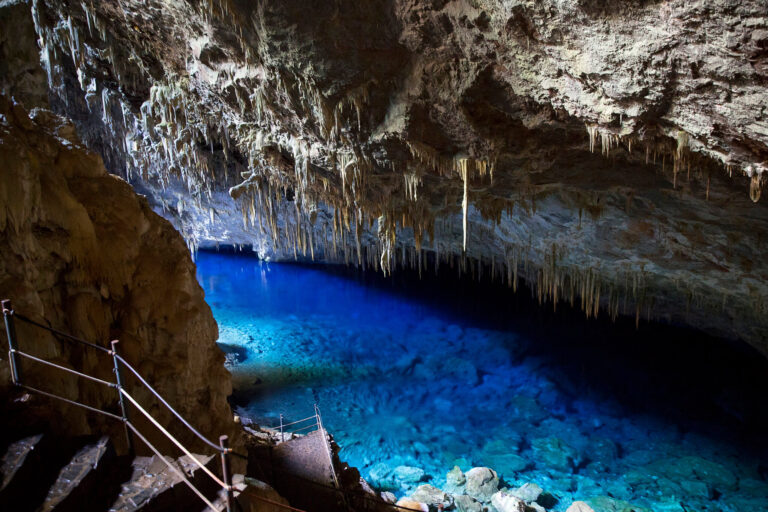The group’s final output will be a report detailing the steps taken by member states to address professional qualification challenges and promote robust, sustainable and balanced global tourism growth.
 Gruta do Lago Azul, Bonito, Mato Grosso do Sul. Photo: MTur
Gruta do Lago Azul, Bonito, Mato Grosso do Sul. Photo: MTur
Professional qualifications, sustainability and financing mechanisms for sector development were key topics at the third G20 Tourism Working Group (TWG) meeting, held in Rio de Janeiro on July 1. Chaired by the Brazilian Ministry of Tourism (Ministério do Turismo/MTur), the meeting brought together around 20 delegations from the world’s major economies. The report will outline measures adopted by all members to address the challenges of professional qualifications and promote robust, sustainable and balanced tourism growth.
In her welcoming remarks, Secretary-General Ana Carla Lopez highlighted tourism’s potential to boost economic growth, promote sustainability and foster social development.
“Such meetings are essential to strengthen ties between our two countries, deepen understanding of our cultures and economies, and foster the sharing of experiences that inform important discussions. These include increasing women’s participation in tourism, developing accessible tourism for people with disabilities, and promoting more sustainable and responsible tourism – initiatives that benefit tourists, the environment and especially our residents,” the Secretary said.
Professional qualifications and tourism education
The meeting stressed that professional qualifications are essential for improving tourism services, enhancing competitiveness and generating jobs and income. The group highlighted the need for investment in tourism education and skills development. Discussions on sustainability highlighted the importance of practices that minimize tourism’s environmental impact and promote a balance between economic growth and protecting ecosystems.
“The exchange of experiences and knowledge between our countries and organizations is crucial to ensure that we move forward together in building a more inclusive and responsible tourism that the world needs and deserves,” concluded Secretary-General Ana Carla Lopez.
Commenting on the outcome of the meeting, Head of MTur’s Special Advisory Office for International Relations, Heitor Kadri, said: “Today we concluded our third meeting and are pleased with its outcome. It was a difficult day but one that saw great cooperation. We achieved concrete results and finalized a document that will shape leaders’ decisions at the end of the year. Brazil led in the best way and collaborated effectively with other countries. I am convinced that our discussions will better guide international tourism policy,” Heitor Kadri concluded.
The meeting also provided an opportunity to take stock of the G20 TWG’s discussions and progress from 2010 to 2023, ensuring support and continuity of strategic Summit activities.
Participants included international organizations such as the United Nations Tourism Office, the Latin American and Caribbean Development Bank (CAF), the World Travel and Tourism Council (WTTC) and the Inter-American Development Bank (IDB), each of which offered their perspectives and expertise in the tourism sector.
History of the TWG – The first meeting of G20 Tourism Ministers, then known as the T20, was hosted by the South African government in 2010. Later that year, the second meeting was held under the South Korean presidency to discuss the tourism sector’s contribution to economic growth and job creation.
Agenda – The next Group meeting will take place from 19 to 21 September in Belém, Pará, and will also be attended by the Tourism Ministers of other member states. More than 100 working group and task force meetings will take place during Brazil’s G20 Presidency. A Presidential Summit is scheduled to take place in Rio de Janeiro in November.
/Public Release. This material from the originating organization/author may be out of date and has been edited for clarity, style and length. Mirage.News does not take any organizational stance or position and all views, positions and conclusions expressed here are solely those of the authors. Read the full article here.
Source link

